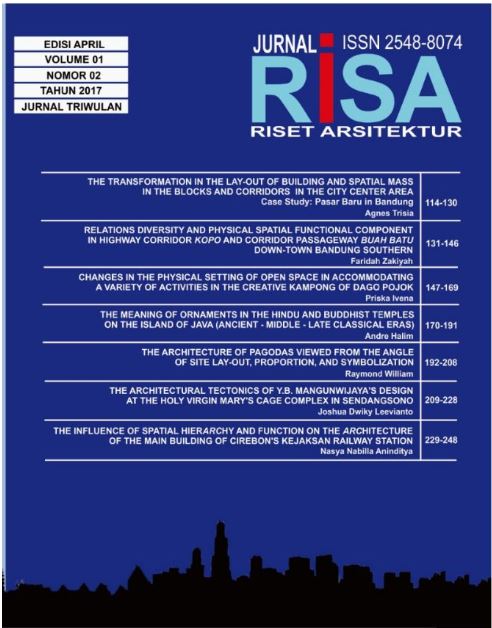THE ARCHITECTURE OF PAGODAS VIEWED FROM THE ANGLE OF SITE LAY-OUT, PROPORTION, AND SYMBOLIZATION
DOI:
https://doi.org/10.26593/risa.v1i02.2392.192-208Abstrak
Abstract – On Bali the islanders enjoy a close relationship with their Creator. The majority of Balinese worship in temples or shrines called Pura. These form a complex of sacred buildings that have a certain significance and function. One prominent type is the so-called Meru or Pagoda. Not all Pura temples have such a pagoda, but those that have more than one are found quite frequently. The placement of a pagoda in a temple is usually made at the main section due to its holiness or purity. Their shape differs from other constructions because their layered roof is multi-tiered, always uneven in number, starting from 3 up to 11. Therefore, these pagodas attain a different height so that their proportions are interesting to observe in order to determine whether there is a pole (patokan) or not. The pagodas carry divine symbols, ones referring to other temples or shrines, or ancestral symbols. This study employs the descriptive-analytical method by conducting a qualitative-quantitative evaluation. The qualitative evaluation investigates the lay-out of the placement and examines symbolization, whereas the quantitative evaluation studies the proportions of the pagodas. The data collection technique contains three parts, namely studying the relevant background literature, making observations, and holding structured interviews. The data analysis subjects the outcome of the observations and interviews to analysis, to be joined with theoretical study. The conclusion may be drawn that the ordering principle behind the placement of pagodas is situated in the main area, considered the most sacred part of a Pura temple. These proportions prove to have several features in common by comparison, so that it can be turned into a pole (patokan). No uniformity was detected in the symbolization of the pagoda in terms of carvings or the number of joinings.
Keywords: pagoda, site lay-out, proportion, symbolization, temples on Bali












